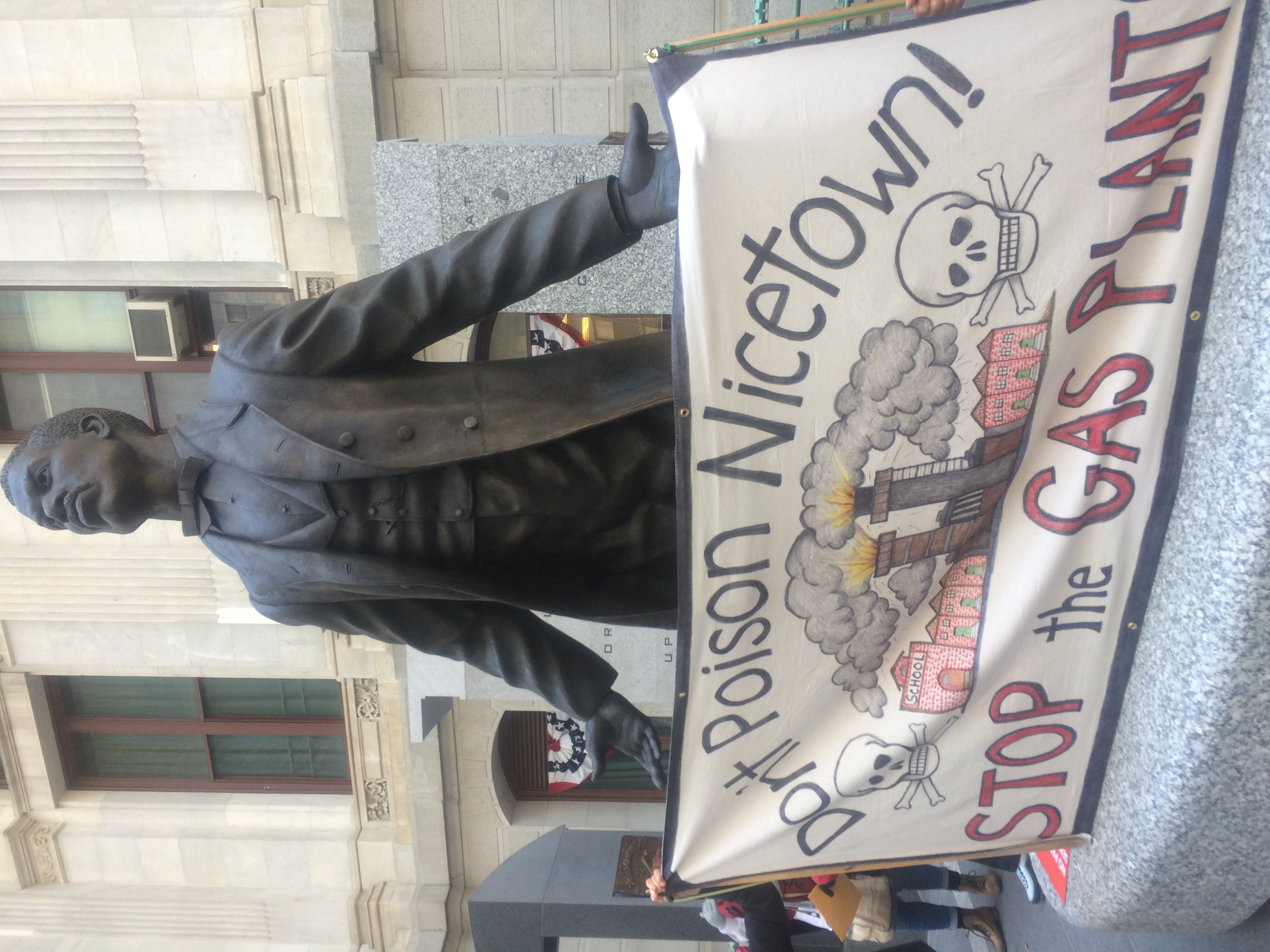Health Department authorizes SEPTA natural gas plant in Nicetown

On Wednesday, Philadelphia Air Management Services (AMS) issued a permit allowing SEPTA to move ahead with its proposed natural-gas power plant in Nicetown. Local environmentalists had fought the SEPTA proposal for over a year, saying it would hurt the air quality in a lower income neighborhood. Blocking the AMS permit was their last hope.
According to AMS, the modeling performed by SEPTA and reviewed by the Health Department indicated that emissions from the plant will comply with federal, state and city air emission requirements. The plant will power some of SEPTA’s regional rail lines and provide heat to the Midvale Bus Depot nearby.
“The [Combined Heat and Power (CHP)] project will, in fact, have such a small environmental impact that the Roberts Complex will continue to be classified as a Minor Source of air pollution under applicable law, and will not pose a substantial risk to public health or the environment,” Kassahun Sellasie, AMS director, wrote in a letter to Councilwoman Cindy Bass, who represents Nicetown.
Earlier this week, Councilmembers Bass, Helen Gym and Curtis Jones Jr. had asked AMS to delay the permit and conduct a health impact study. In separate letters the council members said they understood that the plant meets air quality requirements set by the Environmental Protection Agency, as well as local and state standards.
“However,” wrote Gym, “I believe that it is appropriate for us to look beyond that regulatory floor,” because “it would pose an environmental risk and physical health threat to residents living near the station in ways that are beyond the understanding and data yielded by mandated studies of current regulations.”
AMS’ decision came as a surprise to a group of about 40 residents, health professionals and activists on Thursday, as they rallied outside City Hall. They have been protesting against the $26.8 million plant for more than a year, arguing that its location is racist because Nicetown has a large African American community, which suffers from higher-than-average levels of asthma.
Councilmembers Bass, Gym and Reynolds Brown were invited to the press conference, but none of them attended or sent staff representatives. City Council’s regularly scheduled weekly legislative session was held at the same time as the Thursday protest.
“They issued it yesterday?” Clean Water Action’s Maurice Sampson asked after a reporter broke the news following the press conference. “Well, I would imagine, since they’re violating our environmental rights, the next step is to court.”
Pennsylvania is one of the few states that recognizes the right to clean air and pure water as a basic civil right in the state constitution. Last June, Pennsylvania’s Supreme Court established a broad interpretation of the Environmental Rights Amendment, giving the state a role as trustee for public natural resources.
“Our interpretation of the court’s ruling is that government entities, regulators like Air Management Services and SEPTA, as a commonwealth agency, have a responsibility to uphold that right,” said Philly 350’s Mitch Chanin. “And doing a technical review based on the existing regulations with no additional investigation of health impact does not fulfill their obligation.”
Sellassie said AMS is legally obligated to issue the permit because the plant complies with regulation, but said he’s aware and sensitive to the community’s concerns.
“Any air permit issued by AMS will include conditions that require the operation of equipment to limit air emissions from the CHP project, impose absolute emission limits, and mandate extensive emissions testing,” he wrote to Councilmember Bass. “AMS will also monitor and regularly inspect the Roberts Complex to ensure that SEPTA continues to meet these conditions.”
SEPTA’s director of innovation, Erik Johanson, the project is actually part of the company’s sustainability plan to reduce greenhouse gas emissions. Combined heat and power facilities are promoted by the EPA as a way to mitigate climate change, Johanson said, and the plant will provide a clean source of energy for one-fourth of SEPTA’s bus fleet and half of its Regional Rail lines. It will also provide resiliency in a natural disaster event, by providing enough energy to keep part of the city’s transportation infrastructure running even if PECO’s power grid shut down.
Johanson added that SEPTA is using renewable energy in other facilities — this year they approved a 3.1 megawatts rooftop solar installation, the largest one in the city — but neither solar or wind was feasible for the Midvale plant.
“You could only generate about 15 percent of the power capacity that you need — to do what the CHP is going to do — for about the same cost, if you combine the cost of the solar plus the batteries,” Johanson said.
In response to the racial accusations for locating the plant next to a poor and black community, Johanson said the location was not optional because that’s where the power is fed to the Regional Rail. Johanson added they’re using the best technology available to disperse the low amount of emissions that the plant has.
“All of the modeling that was done, and all of the efforts that were required by the permit, which we have now received, confirm that,” Johanson said.
Residents and activists at Thursday’s press conference said they were shocked by the decision and offended by not being informed and not getting responses to their comments. Philadelphia Health Department spokesman, James Garrow, said AMS sent the information to the state’s regulatory and rulemaking bulletin, as required by law, and was in the process of posting it to its website, responding to commenters and posting in libraries.
Dear reader, please help protect PlanPhilly’s independent, unbiased existence. We depend on your support to continue providing the local public interest news that you value next year. This giving season, please make a tax-deductible donation during our once-a-year membership drive. Thank you for eleven great years of watchdog coverage and counting!
WHYY is your source for fact-based, in-depth journalism and information. As a nonprofit organization, we rely on financial support from readers like you. Please give today.





